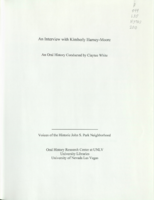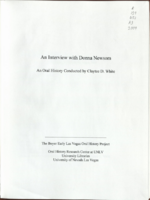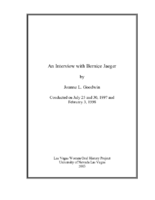Search the Special Collections and Archives Portal
Search Results

Transcript of interview with Dorothy George by Claytee White, October 13, 2003
Date
Archival Collection
Description
After serving as a nurse in World War II in Hawaii, Okinawa and Japan, Dorothy returned home to Chippewa Falls, Wisconsin. She experienced a particularly bad winter and she set out for California but stopped in Las Vegas to visit the family of her traveling companion, a girlfriend from her home town. The girlfriend returned to Wisconsin and George applied for a nursing license and got it within three days. She never left. Dorothy met her husband while working the night shift at Clark County Hospital. He would come in regularly to assist his patients in the births of their babies. Their occupations and their service in World War II drew them together in a marriage that has lasted over fifty years. From 1949 to this interview in 2003, Dorothy George has seen Las Vegas grow from a town that she loved to a metropolitan area that is no longer as friendly. She reminisces about the Heldorado parades, family picnics at Mount Charleston, watching the cloud formed by the atomic bomb tests, raising six successful children, leading a Girl Scout Troop, and working in organizations to improve the social and civic life of Las Vegas.
Text

Transcript of interview with Kimberly Harney-Moore by Claytee White, June 16, 2010
Date
Archival Collection
Description
Kimberly Harney-Moore and her three siblings were raised in the John S. Park Neighborhood in the 1960s and 1970s. Their parents, Tim and Kathleen Hamey, were educators. A nostalgic feeling for the neighborhood remains; perhaps, rekindled when she had close friends buy a house across the street from her childhood home. In this interview, Kimberly talks about the inviting character of the area's architecture, mentions a few names of neighbors she babysat for, and fondly recalls her job at Luv-Its Custard shop. There was a time when she would drive through the old neighborhood and be saddened by the lack of upkeep and the changes, but today it is a place being reborn to a new generation. Note: Tim Harney and Kathleen Harney, Kimberly parents, are also participants in the Voice of the Historic John S. Park Neighborhood oral history project.
Text

Transcript of interview with Donna Newsom by Claytee White, June 11, 2009
Date
Archival Collection
Description
Donna Newsom shares the history of her life in great detail, beginning with her childhood in Georgia and Florida. The family moved many times, following her father's work opportunities. Donna had a close relationship with her father and recalls the many daring adventures on which he took her. After graduating from high school, Donna earned a nursing degree at the Macon Hospital School of Nursing. She remembers dorm life, long hours, and the specific training nurses received in the late forties. Her career began at age 19 with a year of working at Macon Hospital as a graduate nurse, and then she made plans to leave the South. Donna's memories include moving to Houston, living in a boarding house, her first date, and working at Hermann Hospital and then Methodist Hospital. She then answered an ad to work at a Girl Scout camp in Colorado, and her roommate there became a mentor and one of her staunchest supporters. With help from her mentor, Donna went on to earn a teaching degree in Austin, Texas, met and married her husband Sam Newsom, and got involved in real estate. She relates the many experiences they had during Sam's Navy career, her teaching experience in New Orleans, and their eventual move to Las Vegas. Sam and Donna loved Las Vegas from the moment they moved here. She recalls many details of her employment at UMC, the differences in health care compared to down south, and the feeling of being safe no matter the time of day or night. Donna stays active in tutoring, the OLLI program at UNLV, and working for the Salvation Army women's auxiliary. She and Sam also get together with his golfing buddies and their wives for dinners in their various homes.
Text

Transcript of interview with Rabbi Mendy Harlig by Barbara Tabach, October 18, 2017
Date
Archival Collection
Description
Known throughout the Las Vegas community as Rabbi Mendy, Mendy Harlig is a leader of the Chabad in Las Vegas, which was introduced to the valley in 1990 by his brother Rabbi Shea Harlig. Since his youth spent growing up in the Crown Heights section of Brooklyn, where he was surrounded by Hasidic Jews, Rabbi Mendy seemed destined to become a Chabad rabbi. During the early 1990s he often visited Las Vegas and assisted his brother at the Chabad of Southern Nevada. Then in 1997 he met and married Chaya Harlig and the couple permanently relocated to the valley to be the spiritual leaders of the Chabad of Green Valley. As their family grew, so did their importance to the Chabad movement in Las Vegas. During this interview, Rabbi Mendy touches upon the nature of Chabad teachings and observance in the so-called “Sin City” persona of Las Vegas. He also shares about his participation in the Las Vegas Metro Chaplaincy program. He particularly reflective of his active role immediately after of the horror of the October 1 mass casualty at the Route 91 country music festival and his perspectives afterwards.
Text

Transcript of interview with Steve Riback by Barbara Tabach, December 12, 2017
Date
Archival Collection
Description
Sgt. Steve Riback is a Detective Sergeant for the Las Vegas Metropolitan Police Department. He has been with the police force for nearly twenty years. On the night of the Route 91 Harvest festival shooting, he had just returned home shortly after 10pm. He had been on an overtime assignment at the Golden Knights hockey game at the T-Mobile prior to the shooting. When he was abruptly awaken by a call from his lieutenant, he was oblivious to the time and immediately rushed into action—contacted his squad members and sped to his station in northwest part of the city. He reflects on his overwhelming pride of the police that day, recalling what he heard on his police radio, seeing the rush of police cars being dispatched, and watching a body camera video later. Sgt. Riback’s squad was assigned to Spring Valley Hospital where they worked tirelessly to identify victims, both injured and deceased. His reflections stir the image of medical professionals and police officers urgently fusing together to handle the situation at hand. Riback shares a myriad of emotions, talks about the options available for officers to deal with their personal trauma, and how he explained to his eight-year-old why Daddy was crying. Riback is also known as the Kosher Cop and has authored a book, My Journey Home, about becoming an observant Orthodox Jewish officer and his struggle for the right to wear his beard and a yarmulke while on duty.
Text

Transcript of interview with Kim Bird & Pam Fogliasso by Claytee D. White, February 8, 2013
Date
Archival Collection
Description
Kim Bird's family moved to Las Vegas in 1955 when she was twelve years old. Pam Fogliasso arrived in 1954 with her family in 1954, when she was ten. Kim married and had a son and a daughter; she lives in Las Vegas. Pam married, had two children, and lives in Parumph, Nevada. Though Kim and Pam moved here in the mid-1950s, they had family members who had lived in Southern Nevada and worked on building Hoover Dam - Kim's grandfather and Pam's great-uncle. Both women remember growing up in a Las Vegas that was run by the mob and safe for teenagers; meeting friends in local hangouts such as the Blue Onion and attending sock hops, babysitting, and cruising down Fremont Street. They attended high school with black students but were also aware of the segregation that existed on the Strip. This interview focuses on Kim and Pam's experiences growing up in Las Vegas, and on their teenaged years attending Rancho High School.
Text

Transcript of interview with Bernice Jaeger by Joanne L. Goodwin on July 25, 1997, July 30, 1997, & February 3, 1998
Date
Archival Collection
Description
Interviewed by Joanne L. Goodwin. Bernice Smith was born in Cincinnati, Ohio, on July 27, 1934. She married Ivan Jaeger in 1955. He and his family were involved in the underground gaming industry in the Midwest. When it shut down in 1961, they moved to Las Vegas where Ivan worked first as a dealer and later in various executive gaming positions. Bernice was one of the fist students to attend Clark County Community College (later Community College of Southern Nevada) when it was founded in 1971. She earned a liberal arts degree in 1973 and a degree in hotel administration in 1974. Bernice worked as the secretary of Inez Rambeau, the director of convention sales at the Riviera Hotel and Casino. After a few years, she became the assistant of the hotel director at the Riviera. Later Bernice was the personal secretary to the owner and general manager of the Aladdin Hotel and Casino. She left that position in 1984, completed a bachelor's degree in the field of women's studies, and started Flex-Time, a temporary employment agency catering to working women. Then she was hired by Ira levy, the new owner of the Continental Hotel and Casino to be his assistant general manager. In 2003 Bernice earned a master's degree in counseling at the University of Nevada, Las Vegas, and she now works for Legal Rehabilitation Services, leading court-mandated group counseling for people in domestic violence situations
Text

Transcript of interview with Florence McClure by Joanne Goodwin, January 24, 1996 & February 6, 1996
Date
Archival Collection
Description
Florence McClure came to Las Vegas later in her life, but the state felt her presence and the community her contributions as if she were a native daughter. Introduced to the League of Women Voters in 1967, McClure met her political mentor Jean Ford and learned how to practice the core elements of democracy. She put those tools to work in a number of ways, however her participation in the creation of the Rape Crises Center and her advocacy for locating the women’s prison near Las Vegas are two of her long-lasting efforts. Florence Alberta Schilling was born in southern Illinois where she enjoyed the security of a tight-knit family and the independence to test her abilities growing up. She graduated from high school and attended the MacMurray College for Women at Jacksonville. With the attack on Pearl Harbor in 1941, she began a series of jobs working for the war effort. She moved to Ypsilanti, Michigan with a girlfriend to work at the Willow Run Army Airbase and then moved to Miami, Florida where she worked for the Provost Marshall in the Security and Intelligence Division. She met her husband, James McClure, at the time and they married in 1945. During the next several years, they raised a family and moved around the country and to Japan with the military. McClure came to Las Vegas in 1966 as part of her work in the hotel industry which she engaged in after her husband’s retirement from the military. She had worked in California and Miami Beach, but it was Burton Cohen in Los Angeles who invited her to join him in a move to Las Vegas to build the new Frontier Hotel and Casino. Following the completion of the Frontier, she moved to the Desert Inn with Cohen in 1967 and worked as the executive office manager. After a few years, she decided to leave the industry and complete her college education. She graduated from UNLV in 1971with a BA in Sociology with an emphasis on criminology. She was 50 years old. McClure had been a member of the League of Women Voters for a few years at that point and had learned the political process from Jean Ford and workshops on lobbying. She had numerous skills that were waiting to be tapped when she attended an informational meeting on the incidence of rape in the Las Vegas valley. From that meeting, a small group of individuals, including McClure, began the organization Community Action Against Rape (later renamed the Rape Crisis Center) in 1973. It was the first agency in the area devoted to serving individuals who had been assaulted and changing the laws on rape. The organization’s first office was set up in McClure’s home. Over the next decade, she worked to change attitudes and reshape policy by constantly raising the issues of sexual assault with police officers, emergency room doctors, judges, and legislators. Her role as an advocate took her into hospital emergency rooms and courtrooms to assist victims. It also took her to the state legislator to lobby repeatedly for a change in laws. During this period, journalist Jan Seagrave gave McClure the nickname “Hurricane Florence” - a fitting moniker that captured the force with which McClure attacked the issue. As a result of her efforts and those of the people with whom she worked, we now 1) recognize rape as a crime of assault; 2) forbid the sexual history of a rape victim from being used against her in court; and 3) recognize marital rape. In addition to learning about Florence McClure’s activities, the reader of this interview will gain information on the role of civic organizations like the League of Women Voters in engaging the voluntary efforts of women in the post-war years.
Text

Transcript of interview with Raymonde Fiol by Barbara Tabach, August 12, 2015
Date
Archival Collection
Description
In this interview, Fiol discusses her experience as a a hidden child in the Holocaust and her family's history. She also talks about her involvement with the Las Vegas Holocaust survivors group.
Raymonde "Ray" Fiol is president of the Holocaust Survivors Group of Southern Nevada. A Jewish Holocaust survivor whose parents were killed in Auschwitz, Fiol was hidden by a Christian family of Resistance fighters during her childhood in Nazi-occupied Paris, France. She married American serviceman Phil Fiol and left Paris in 1957. The couple lived in New York City where she worked in inventory control. She retired to Las Vegas, Nevada around 2003 and became active in the local Holocaust Survivors Group. In 2007, she became president of the organization, which provides essential services to Holocaust survivors and helps them share their stories. Fiol is also a member of the Nevada Governor?s Advisory Council on Education Relating to the Holocaust and the coordinating council of Shoah International. Her dedication to preserving the memory of the Holocaust and caring for survivors earned her the Nevada Senior Citizen of the Year award from the Nevada Delegation of the National Silver Haired Congress and the Aging Services Directors Organization in 2014, and in 2013 she was named Mensch Volunteer of the Year by the Jewish Federation of Las Vegas. In this interview, Ray reflects upon her traumatic childhood experiences, and shares how she learned details of her family?s history from a woman in France who had researched the destiny of the local Jewish community. She also discusses her involvement with the survivors group, and the positive impacts of its outreach activities, as well as goals to ensure future generations learn about, and from, the Holocaust.
Text

Transcript from interview with Sari and Paul Aizley by Barbara Tabach, November-December, 2015
Date
Archival Collection
Description
Paul and Sari Aizley discuss their many accomplishments as residents of Las Vegas, including those in education and with Jewish Family Service Agency.
Text
